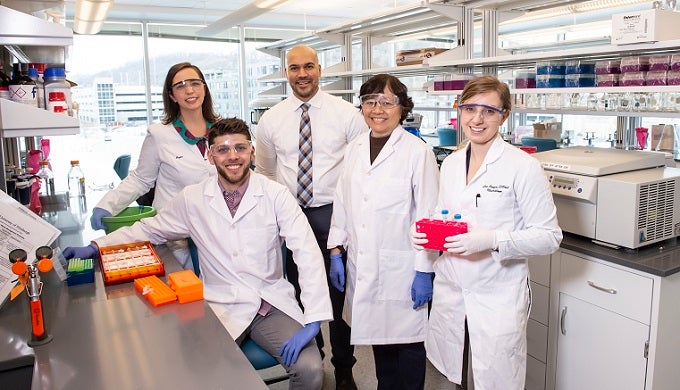
The Laryngeal Biology Laboratory explores fundamental questions in laryngology. Using a multidisciplinary approach, our goal is to leverage improved patient care and treatment outcomes through elucidation of the underlying pathophysiology and biomechanics of voice disorders. To achieve this goal we are presently conducting two lines of research:
- Pre-clinical testing of the safety and efficacy of treatments for voice disorders
- Development of a patient-specific surgical planning tool for laryngoplasty
Pre-clinical testing of the safety and efficacy of treatments for voice disorders:
 The lifetime prevalence of voice disorders in the U.S. adult population is 30% with point prevalence rates of 6.6% to 7.5%. These disorders are debilitating and lead to significant morbidity, loss of income, and long-term disability. Point prevalence and census estimates suggest that nearly 20-23 million adults may experience dysphonia annually, with the cost of treatment and lost wages approaching $13 billion dollars. These annual direct costs are comparable to those associated with chronic obstructive pulmonary disease, asthma, diabetes, and allergic rhinitis.
The lifetime prevalence of voice disorders in the U.S. adult population is 30% with point prevalence rates of 6.6% to 7.5%. These disorders are debilitating and lead to significant morbidity, loss of income, and long-term disability. Point prevalence and census estimates suggest that nearly 20-23 million adults may experience dysphonia annually, with the cost of treatment and lost wages approaching $13 billion dollars. These annual direct costs are comparable to those associated with chronic obstructive pulmonary disease, asthma, diabetes, and allergic rhinitis.
Among evaluations for dysphonia, nearly 43% of short-term disability claims are associated with phonotraumatic lesions. Thus, improving the care of patients with voice disorders remains a significant public health need. As a necessary and essential first step to address this need, our research program has established a systematic effort in discovery and pre-clinical testing in the area of voice disorders. Our efforts to date have provided critical new insights into the molecular pathophysiology of phonotrauma and novel approaches that can support studies of gene/protein, structure, and function in pre-clinical models. Our research efforts are funded in full by the National Institutes of Health, National Institute on Deafness and Other Communication Disorders.
Development of a patient-specific surgical planning tool for laryngoplasty:

Our research program advances computational modeling of biological systems to address a significant clinical problem that rests at the intersection of engineering, science, and medicine. In phonomicrosurgery, the complex interaction among glottal airflow, vocal fold tissue, and surgical implant design presents a perfect problem for computational modeling to solve. Our bioengineering approach leverages current advances in microimaging, modeling and high-performance computing of biological systems to support translation of a surgical planning tool for type I laryngoplasty.
Our research program deploys a multidisciplinary group of engineers, basic scientists, clinical outcomes researchers, and surgeons to initiate and support new directions for scientific discovery in the area of patient-specific modeling in the treatment of voice disorders. Ultimately, the goal of our programmatic research efforts focuses on the translation of basic science discoveries to improve the overall health and health related outcomes in patients with voice disorders. Our research efforts are funded by the National Institutes of Health, National Institute on Deafness and Other Communication Disorders.
